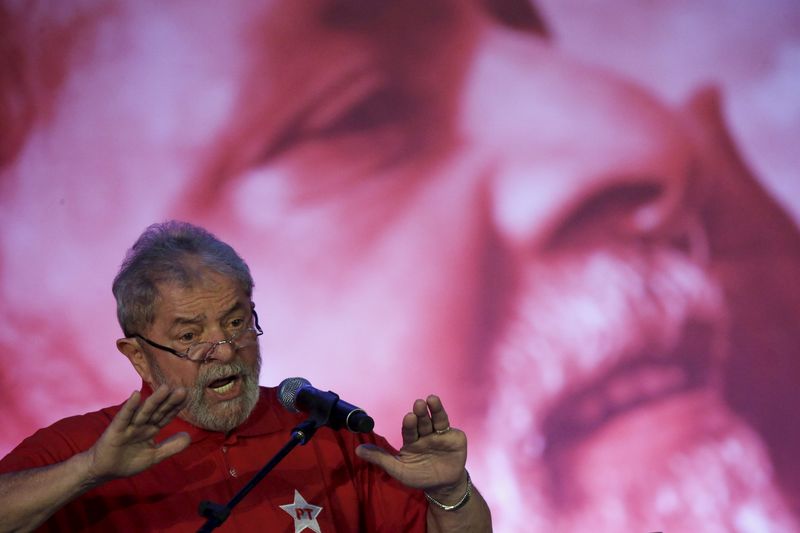By Paulo Prada and Asher Levine
Sao Paulo (Reuters) - An ongoing political and economic crisis once more threatens to fell the tallest tree in Brazil's political landscape: former President Luiz Inacio Lula da Silva.
His once-sterling legacy, previously tarnished by a Congressional vote-buying scandal, is being sullied further by economic and political turmoil that has driven approval ratings for his hand-picked successor into single digits.
And a far-reaching corruption probe around state-run oil company Petroleo Brasileiro SA, or Petrobras, has implicated key aides and associates, once more staining his scandal-plagued Workers' Party, now in its 13th year in power.
Although Lula has not been charged with a crime - and it is too early to write off a leader who has dominated Brazilian politics for well over a decade - love for the man Barack Obama once called "the most popular politician on earth," is waning.
Police this month again arrested his former chief of staff, already convicted in the vote-buying scheme, and charged him with taking bribes while in office. And prosecutors are offering plea deals to construction company executives with close ties to Lula who are now at the heart of the Petrobras investigation.
Combined, it means that even long-time allies are wavering.
"Lula presided over what many believed was the most successful government in Brazil's democratic history," says Carlos Alberto Libanio Christo, a leftist writer, monk, activist and former Lula advisor who is better known as Frei Betto. "But the foundations he left behind are proving not so solid."
The disenchantment signals the biggest shift in Brazilian politics since 2002, when voters, once wary of Lula as a leftist radical, decided to trust him with what is now Latin America's biggest economy.
It also shows how quickly his achievements as president, like the lifting of 40 million people from poverty, have begun to unravel. After a decade-long boom, Brazil is now believed to be in recession, unemployment and inflation are on the rise and two out of three polled want to impeach Lula's successor, President Dilma Rousseff.
Even the bedrock support Lula enjoyed among blue-collar voters is begging to give way.
"Everything is getting worse and worse," says Marta Marques, a 39-year-old street sweeper in the gritty streets of central Sao Paulo, Brazil's biggest city and seat of the industrial labour movement from which Lula in the 1970s emerged as a leader.
"I had faith in Lula originally, but that has all changed."
The turning tide dampens the hopes of followers who believed that Lula, whose charisma and legendary negotiating skills until now made him politically indestructible, could revive the party and lead it to a fifth consecutive mandate in 2018.
PARTY PERSONIFICATION
At present, his biggest liability are efforts by media and political opponents to link Lula to corruption at Petrobras, which began during his presidency and involved hundreds of millions of dollars in kickbacks to company executives and party operatives by builders in exchange for contracts.
Particularly worrisome, many speculate, could be testimony in any plea deal by Marcelo Odebrecht, the arrested chief executive of Odebrecht SA [ODBES.UL], one of several contractors tainted by the scandal.
The company, Latin America's largest construction firm, is also one of many corporations with whom Lula accepted paid speaking engagements after leaving office.
In a separate probe, prosecutors are investigating whether Lula, on overseas trips after leaving office, improperly used his influence to help secure Odebrecht contracts.
In public appearances and in official statements, Lula has repeatedly denied wrongdoing and portrayed strikes against him as attacks against the working class.
His lawyers are suing O Globo, a Rio de Janeiro daily, and Veja, a national news magazine, for recent stories they say are libelous.
True or not, the speculation has fanned flames of disgust among critics of the Workers' Party, or PT.
"He is the very personification of the PT," says Antonio Carlos Menders Thame, a congressman from the chief opposition party. "PT fatigue is immeasurable given the corruption."
At marches across Brazil last weekend, when hundreds of thousands of people called for Rousseff's impeachment, more critics than ever heaped Lula's name onto the bonfire.
In Brasilia, the capital, a giant balloon of the bearded former president in prison stripes floated over the throngs and quickly became the week's Internet meme.
Though Lula hasn't recently breached the possibility of a 2018 run, early projections with him in the race suggest he would lose to a centrist rival.
Still, political analysts warn that Lula should not be discounted unless investigators come up with proof that ties him to corruption. When the vote-buying scheme toppled top aides and nearly crippled his first term, Lula prove deft at distancing himself from the scandal, coasting to re-election while others took the blame.
"There is still no other leader in Brazil as able to communicate and rally support," says Mauro Paulino, director of Datafolha, a leading pollster.
And many among the working class, who make up well over half the electorate, still say they are willing to give him the benefit of the doubt.

"I think a lot of this is conspiracy by a class that wants to destroy his name and the history that he made," says Adalto Valentim, a 60-year-old chauffer washing his boss's BMW in Sao Paulo. "I would vote for Lula again."